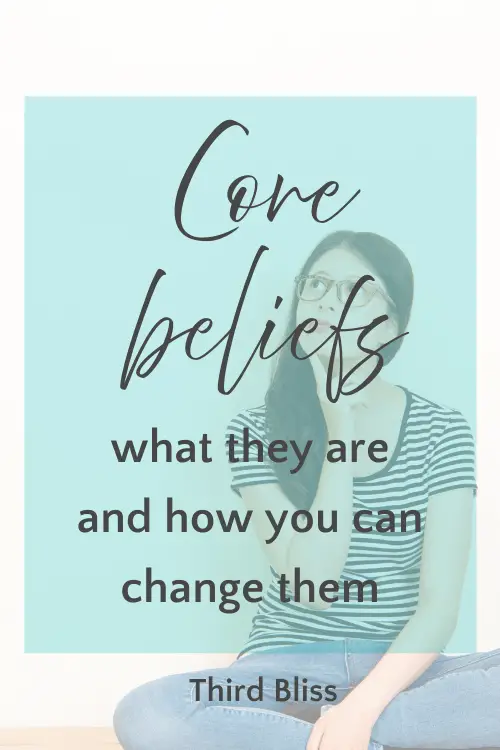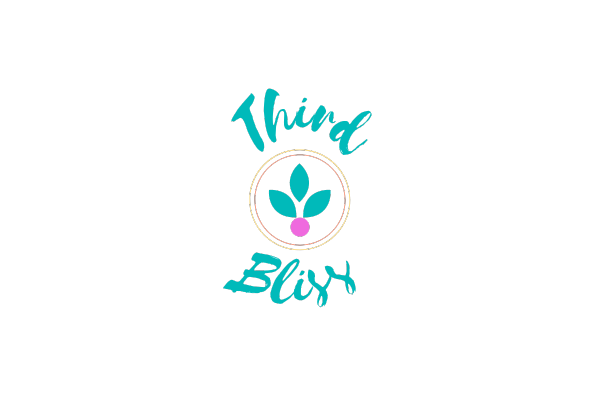Core beliefs are deeply held beliefs about yourself and how you perceive the world. It’s essentially a perception of reality that you think is true.
This is why core beliefs have the power to shape and influence your life. Core beliefs determine how you think and behave in wonderful and incredible ways.
Core beliefs can also affect your physical and mental health in ways that can harm, such as having low self-esteem or believing you’re not worthy of love.
Our core beliefs are formed early on in our lives. They can come from family members, the people who raised us, our environment, and everyone & everything else that we come in contact with.
This is why core beliefs can be hard to change because they can become ingrained in us from birth.
Not all core beliefs are permanent, though. Beliefs can actually be changed with time, effort, and the right tools and techniques.
In this blog post, I’ll go over what beliefs are, how they’re formed, how they influence you, how to identify core beliefs, and how you can change them.

CONTENTS
Types of core beliefs.
Examples of common core beliefs.
How positive and negative core beliefs affect your body.
How core beliefs are formed
How core beliefs influence our life.
Why beliefs are hard to change.
How can I change my core belief?
Closing thoughts.
Types of core beliefs.
A core belief can be extrinsic, which is a type of belief that can be interpreted differently from person to person.
For instance, someone might appear shocked and upset to person A. But to person B, that same person might appear surprised. Both people believed their interpretations of the facial reaction were true, even though they were different.
Core beliefs can also be internalized. Take, for example, a child that is raised by a very critical parent. If a parent constantly tells the child that he is not good enough, the child can internalize the idea and interpret it as truth, thus believing the criticism.
Most common beliefs are categorized as positive or negative. Positive core beliefs can uplift you and make you feel good about yourself.
Negative core beliefs, on the other hand, are things that you believe about yourself that feel hurtful or upsetting. Take a look at the examples of core beliefs in the next section and see if any of them resonate with you or not.
Examples of common core beliefs.
Here are some examples of core beliefs that are positive and negative.
Positive core beliefs:
- Good things always happen to me.
- There is good in all people.
- I am smart.
- I am worthy.
- People think I’m attractive.
- The world is an interesting and awesome place.
- I am more than capable at what I do.
Negative core beliefs:
- I am not worthy.
- I fail at everything I try.
- People are so judgmental.
- I can’t trust anyone.
- No one likes me.
- I will never find anyone to love.
- I am not smart enough.
“We heal ourselves on the mental level as we become aware of our core beliefs, release those that limit us, and open to more suportive ideas and greater understanding.” – Shakti Gawain

How positive & negative beliefs affect your body.
Positive effects of core beliefs.
Let’s take a look first at the effect of positive core beliefs on your body.
“According to a landmark review, positive expectations are associated with better health. Science Daily reported that the reviewers were shocked by the consistency they saw in the data. Over and over the evidence showed that a person’s positive beliefs are a strong influence for good on their health.”
A study on the “Negative and Positive Beliefs Related to Mood and Health” was published in the American Journal of Health Behavior.
Researchers found that “patients’ beliefs about their health and medical treatment are a potent factor in the success of medical treatment.” They used several modes of assessment to relate beliefs with health outcomes.
“A person’s beliefs about their health status, the risk of having a condition, and the likelihood of a positive outcome from health behaviors predict whether they will engage in health-related behaviors.” In another model, each of the health-related behaviors “emphasizes the key role of health beliefs in shaping attitudes, norms, and perceived control over health behaviors.
A person’s perception of control, a belief in a positive outcome in relation to health behaviors, and having the energy to carry out self-care can help increase the willingness to improve and sustain one’s health.
When we believe that we are safe, happy, and fulfilled, our bodies respond positively, which has a positive effect on our emotions and biochemistry.
Negative core beliefs and their effects.
The study on “Negative and Positive Beliefs Related to Mood and Health” also revealed the other end of the belief spectrum.
Patients with more depressive symptoms, for example, may have a negative core belief of their health or even believe that attempts to improve their health are futile.
They consistently report more severe functional disability and poorer health-related quality of life.
Furthermore, a study by Penny Sarchet revealed a link between negative core beliefs and physical suffering.
“She saw that in a doctor-patient relationship the patient’s belief makes a world of difference as to that person’s health. What a doctor says and what the patient believes may be more closely tied to the patient’s outcome than what the doctor does physically.
A doctor’s warnings about possible negative side effects regarding a person’s health can increase the likelihood of the person experiencing pain or suffering, as the researchers suggested could happen.
When our core beliefs are attached to a negative thought, they can cause stress on our bodies.
When the body is constantly under stress, bodily functions can be negatively affected, resulting in symptoms like:
- indigestion
- heart palpitations
- insomnia
- headaches.
This is why negative core beliefs can limit us or hold us back.
“Keep your dreams alive. Understand to achieve anything requires faith and belief in yourself, vision, hard work, determination, and dedication. Remember all things are possible for those who believe.” – Gail Dever.
How core beliefs are formed.
Core beliefs are formed in the brain. The brain is made up of trillions of neural connections. Information is sent to the gray matter, via our senses, to be processed.
Neurons are then stimulated and new synaptic dendrites are created and grow and alter over time. The more times they are stimulated, the stronger they become.
The information undergoes a filtering process as it travels across the synapses. One area where information is initially processed is the frontal lobes right behind the forehead.
The frontal lobes are responsible for learning, behavior, personality, and the development of beliefs.
The information then travels down to the hippocampus, amygdala, and hypothalamus to be processed even further. These 3 areas of the brain are responsible for the development of beliefs.
The information becomes internalized and shaped into ideas. These ideas can become core beliefs, then attach to emotional states, and further intensify & shape our beliefs.
How core beliefs influence our life.
Our core beliefs are the underlying framework of how we perceive our world, which is why they can be so influential.
For instance, in this age of ever-expanding cyber connections, we have the power to uplift or tear each other down.
One example is social media. We have the power to build positive, meaningful connections with people who share our beliefs.
We also have the power to create negative interactions with people just because they don’t share our beliefs.
Emotions and core beliefs.
We experience our world through our senses. If a positive emotion is attached to a particular experience, your mind will form a positive belief about it. On the flip side, a negative emotion linked to a negative experience can form a negative core belief.
Emotions affect our core beliefs in varying degrees of intensity, which in turn can affect our physiology.
Strong feelings can stir up inside of us such as anger or fear if we believe we’re under threat. On the flip side, positive emotions such as joy, gratitude, and happiness can surface easier if we believe we are safe.
Why beliefs are hard to change.
Long-standing beliefs, whether they are positive or negative beliefs, can be hard to change.
The brain can also become so desensitized to negative beliefs that it can feel familiar and even comfortable.
For instance, a child is told over and over that she is not worthy, she believes it and has very little self-worth.
Even if she grows up to have a successful career but still believes that she’s unworthy, she will have trouble overcoming this belief.
A belief that is formed from an early age or is ingrained into someone requires effort, dedication, and a willingness to dig into a well of emotions.
Like the brain, however, beliefs are malleable and can be changed.
“Believe something and the Universe is on its way to being changed. Because you’ve changed, by believing.” – Diane Duane
How can I change my core belief?
When a core belief doesn’t serve you anymore, holds you back, or limits you, then it’s time to change it.
Changing core beliefs can be hard. However, it’s a common misperception that beliefs cannot be changed because they can be masked inside our reality.
We first have to be aware of our core beliefs if we want to change them. This can take time and effort, but changing your limiting belief can help rewire your brain to let go of the old belief and create new, empowering beliefs.
- First, you have to identify core beliefs. Be aware of any negative core beliefs that bubble up to the surface.
- When they surface, just be curious.
- Make note of the feelings attached to it.
- Try to remember where the belief came from.
- Then imagine the old belief dissolving or floating away.
- Then feel the release of letting it go.
- When you’re ready to change your beliefs, you can think of a positive belief or if you have trouble, remember an experience with a good emotion tied to it.
- Allow yourself to feel the positive emotion that is attached to your belief.
You’re probably going to repeat these steps many times but don’t worry because it’s going to take some patience and effort to change a long-held belief system.
“The most powerful beliefs are the ones I call core beliefs, because they tell you who you are. It’s critical to hold positive core beliefs and to activate them in your daily life. The more you activate your core beliefs, the more dynamic and transformed your reality will be.” – Deepak Chopra
Closing thoughts.
Remember that a core belief is a deeply held belief about yourself and the world. Core beliefs can take a long time to form in your mind, making them a part of your reality.
A core belief can become so intertwined with our attitudes and behavior that even if we perceive them as negative, affect our physical and mental health.
This is why core beliefs can be hard to change because even a negative belief that feels familiar can give you a false sense of security.
However, core beliefs, like the brain, are malleable. You can change a core belief that is limiting you by becoming aware of it and how it affects your life.
This is going to take patience, effort, and extra tools, but over time, you will be able to release a core belief that is limiting you and create new core beliefs that are positive, affirming, and empowering
I hope you found these tips to manage your core beliefs helpful. If you have any tips yourself, please let me know in the comments below!
